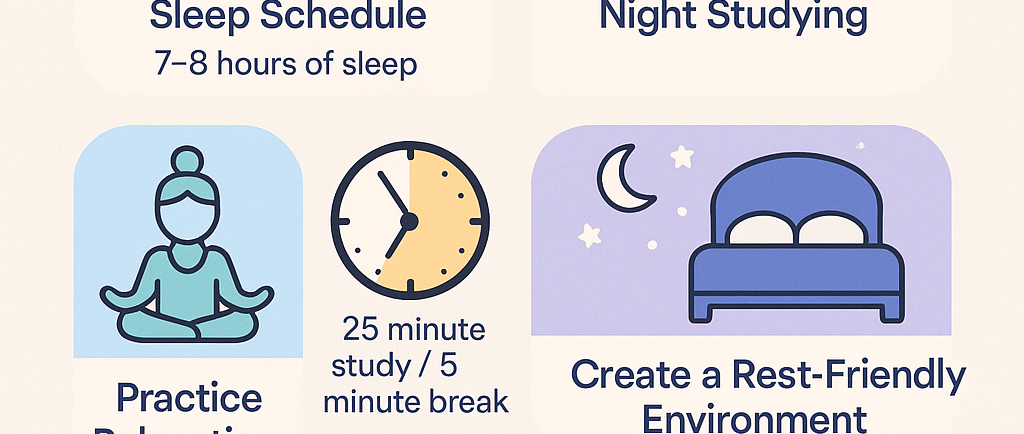How to Get Enough Rest for CBSE Exam Preparation


Preparing for CBSE exams is a crucial period in a student’s life, often marked by intense study, pressure to perform, and a tight schedule. While most students focus on studying long hours, one of the most neglected yet vital elements of success is adequate rest. Without proper rest, even the most hardworking students may find their efforts falling short. Here’s how to ensure your body and mind stay refreshed and focused during CBSE exam preparation.
1.Understand the Importance of Rest
Rest doesn’t just mean sleeping. It includes relaxing your mind and body, taking short breaks, and avoiding mental burnout. Lack of rest leads to fatigue, decreased concentration, poor memory retention, and even mood swings. Quality rest, on the other hand, improves memory consolidation, boosts focus, and helps manage stress — all essential for exam success.
2.Follow a Consistent Sleep Schedule
Maintain a regular sleep routine. Aim for 7–8 hours of sleep each night. Go to bed and wake up at the same time daily, even on weekends. Your brain performs best when it follows a routine, and consistent sleep patterns improve your ability to retain and recall information.
3.Avoid Late-Night Studying
Burning the midnight oil might seem productive, but it’s counterproductive in the long run. Studying late into the night disrupts your natural sleep cycle and leads to poor-quality rest. Instead, study in the early morning when your brain is fresh and better able to process information.
4.Use the Pomodoro Technique
Studying for long, unbroken hours leads to mental exhaustion. Instead, try the Pomodoro Technique: study for 25 minutes, then take a 5-minute break. After four such sessions, take a longer break of 15–30 minutes. These short breaks help refresh your mind and reduce mental fatigue.
5.Create a Rest-Friendly Environment
Make your sleep environment calm and distraction-free. Keep your room dark, quiet, and cool. Avoid using phones or screens at least an hour before bed, as the blue light affects melatonin production, making it harder to fall asleep.
6.Practice Relaxation Techniques
If exam stress is keeping you awake, try relaxation techniques like deep breathing, meditation, or light yoga. These methods calm the mind and promote deeper, more restful sleep. Even a few minutes before bed can make a big difference.
7.Avoid Over-Caffeination
While coffee or tea can help during study sessions, too much caffeine can interfere with your sleep cycle. Limit caffeinated drinks after 4 PM. Instead, drink water or herbal teas to stay hydrated and relaxed.
8.Listen to Your Body
If you feel tired, don’t ignore the signals. Take short naps (20–30 minutes max) if needed, especially in the afternoon. But avoid long daytime naps that can disturb your night sleep.
Final Thoughts
Rest is not a luxury; it is a strategic necessity during CBSE exam preparation. A well-rested mind learns faster, thinks more clearly, and performs better under pressure. So, alongside your revision schedule, prioritize rest. Balance, not burnout, leads to top results.
